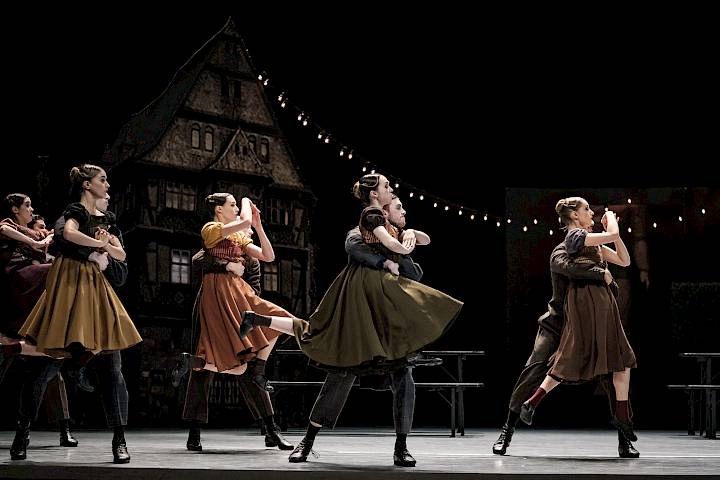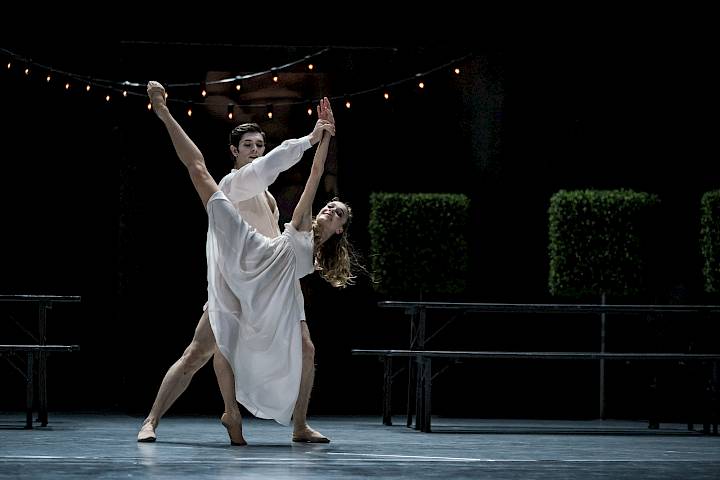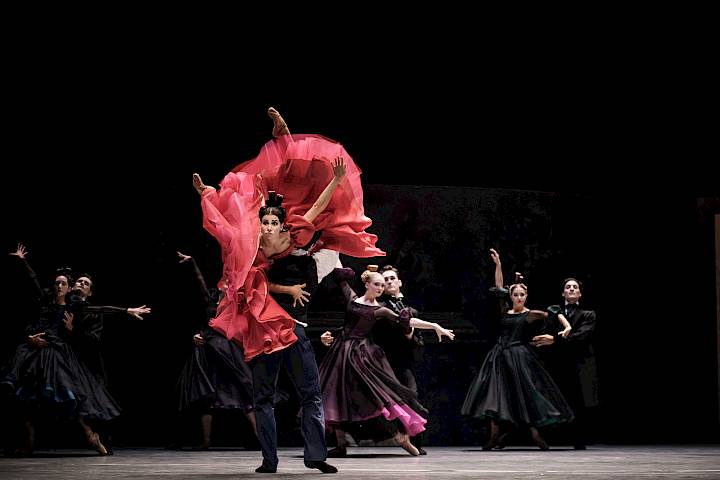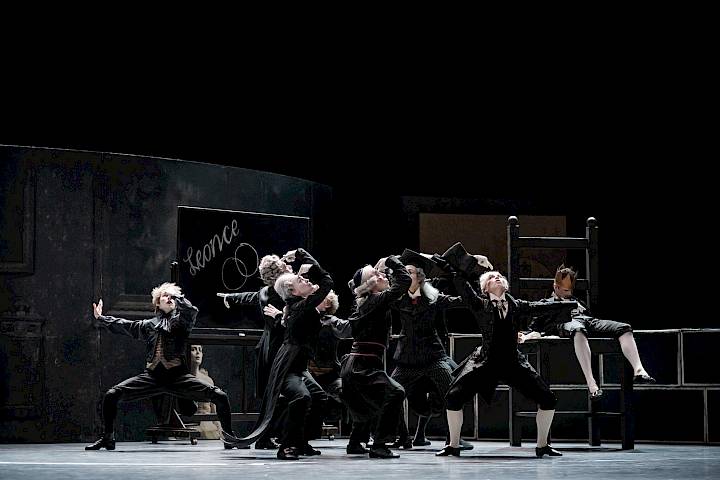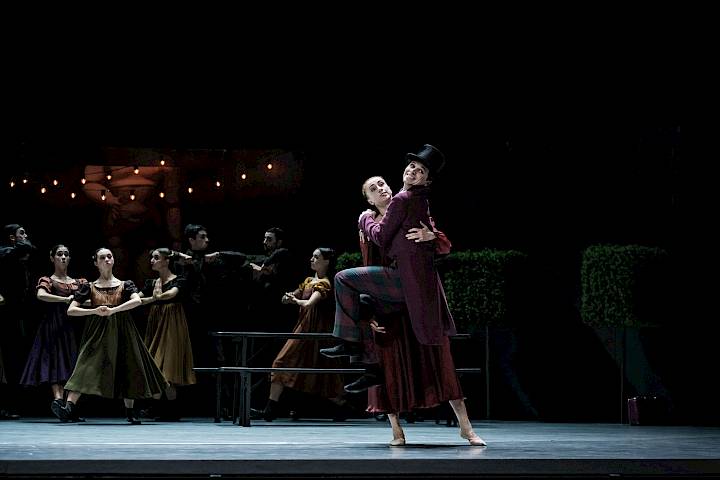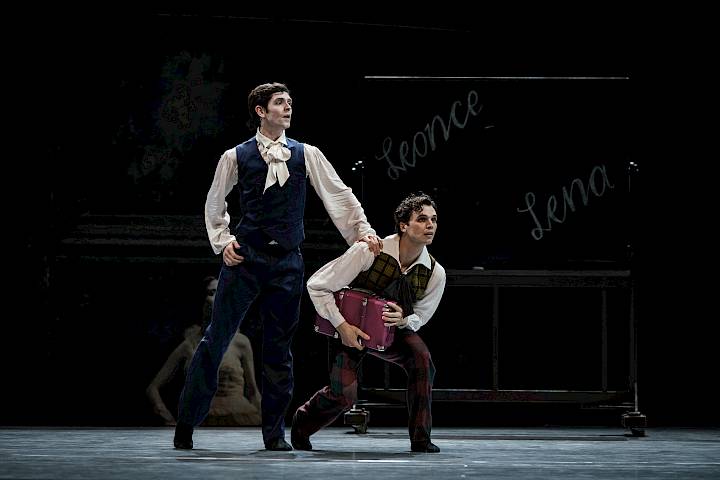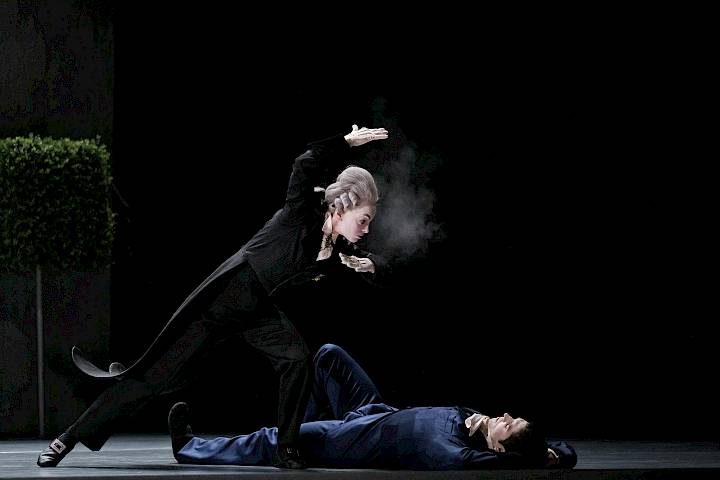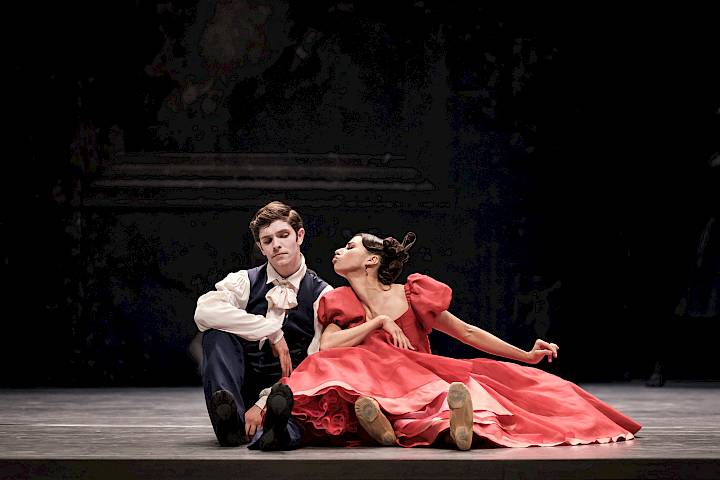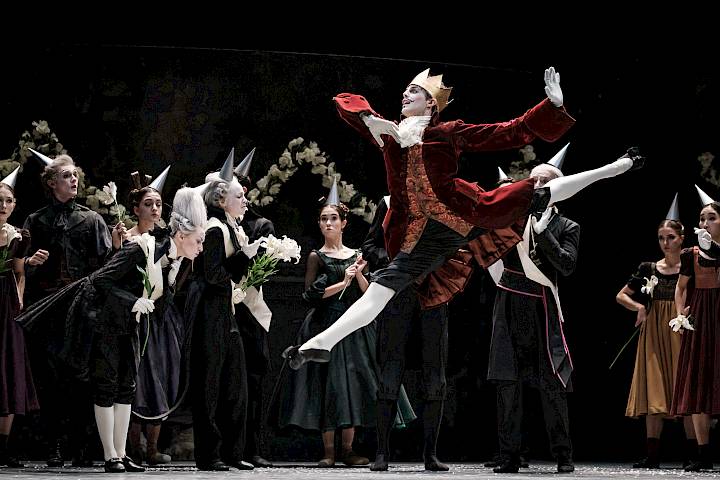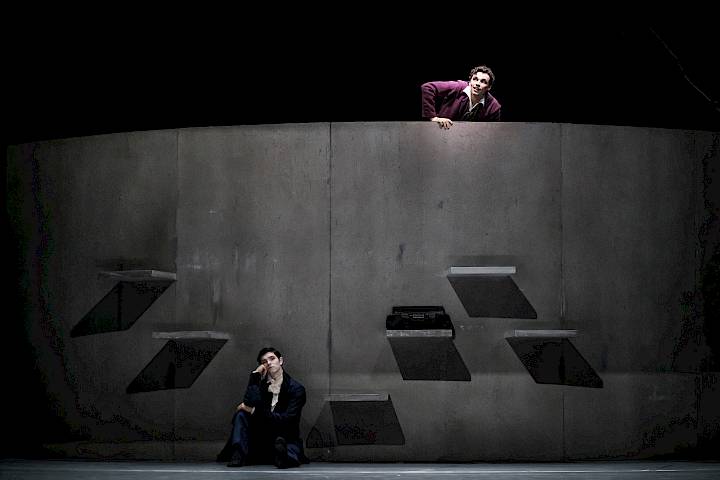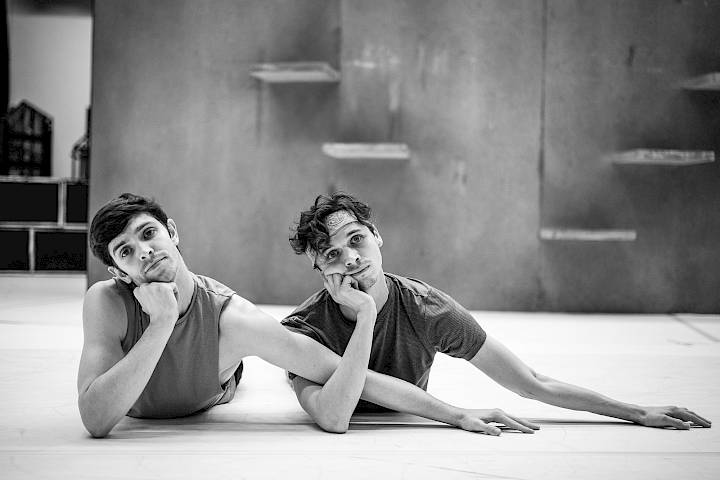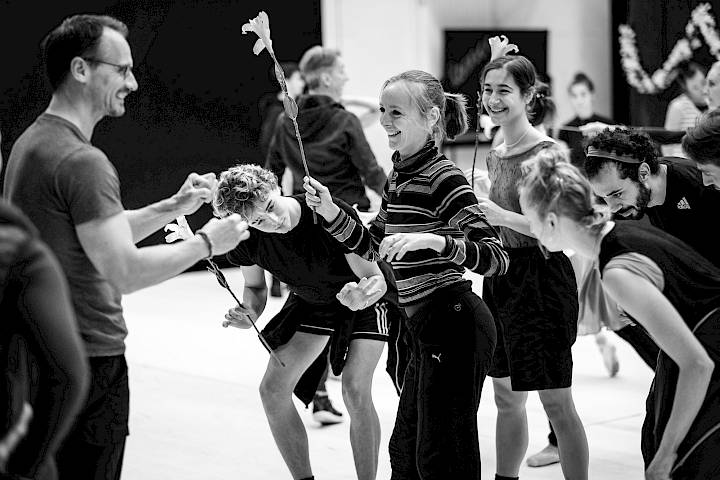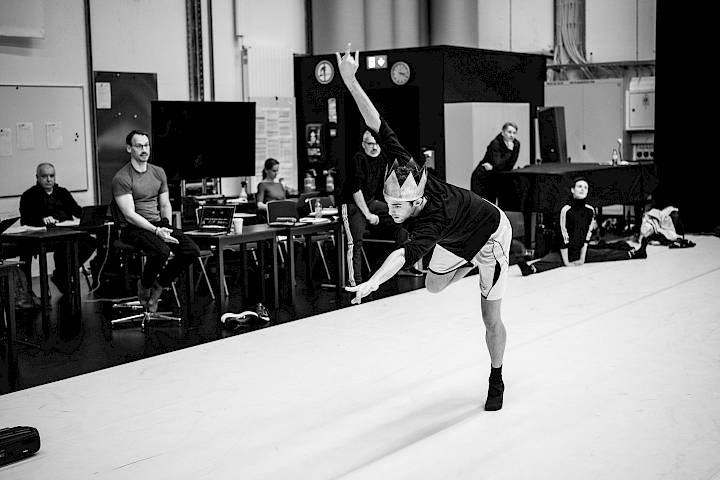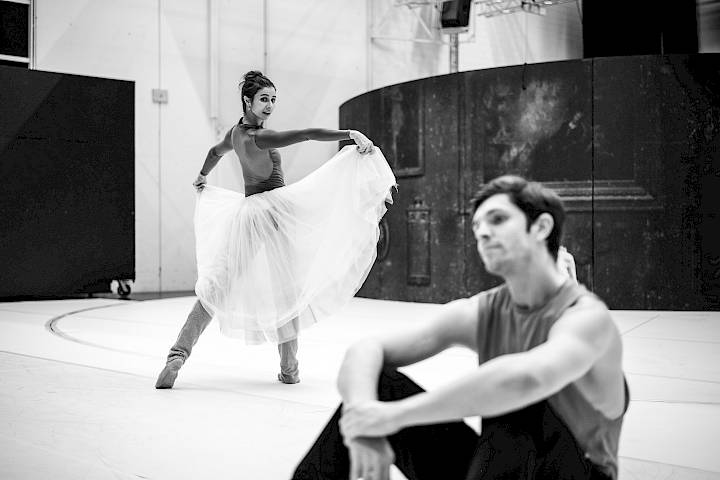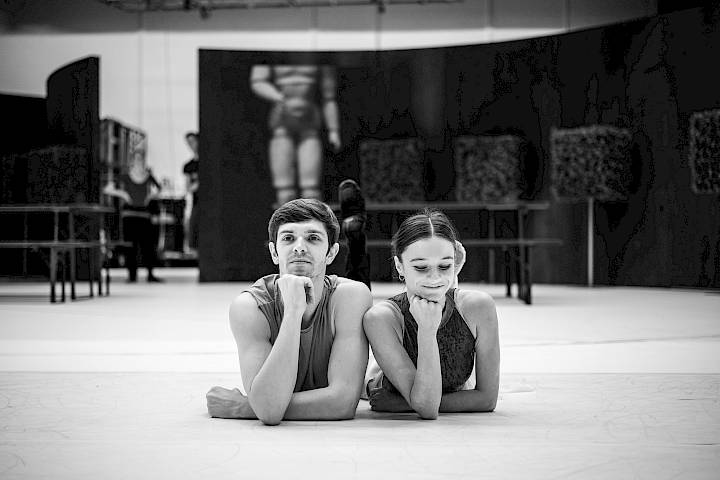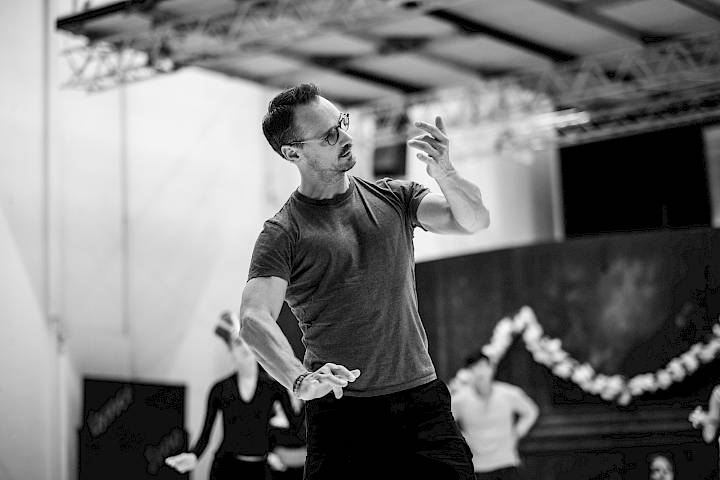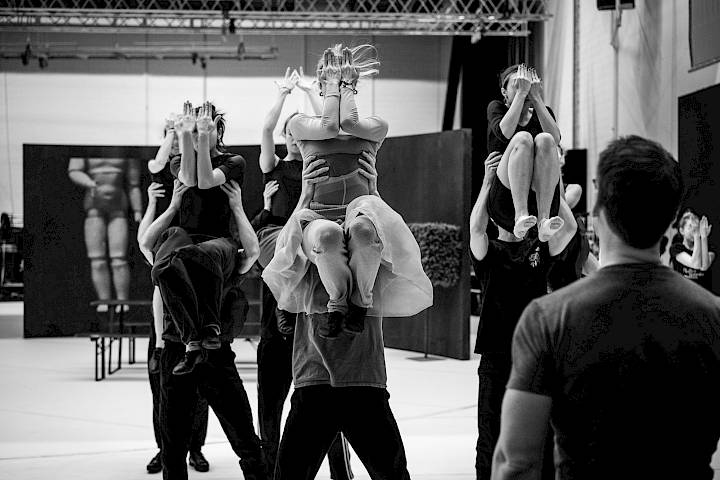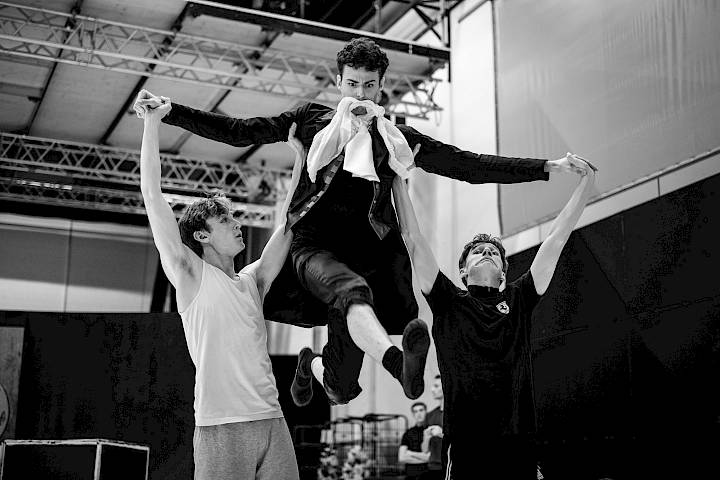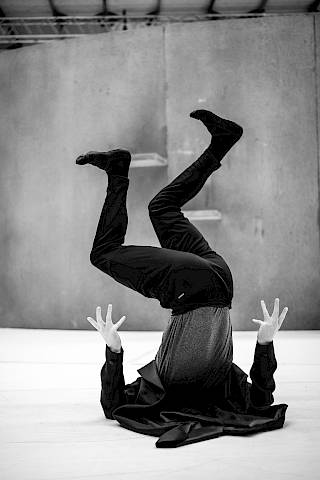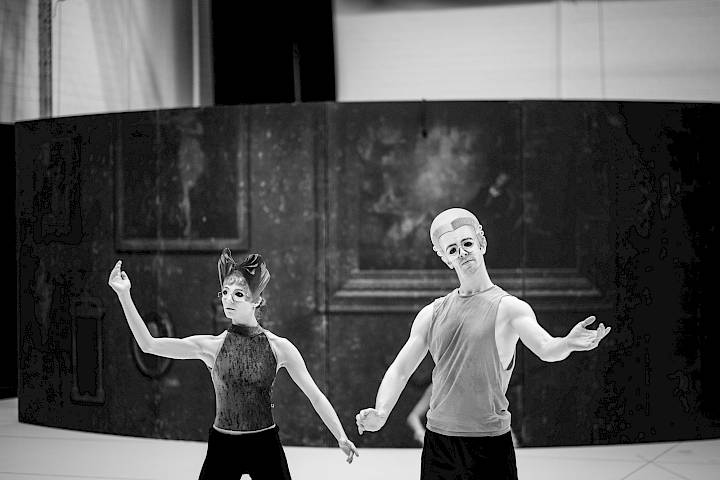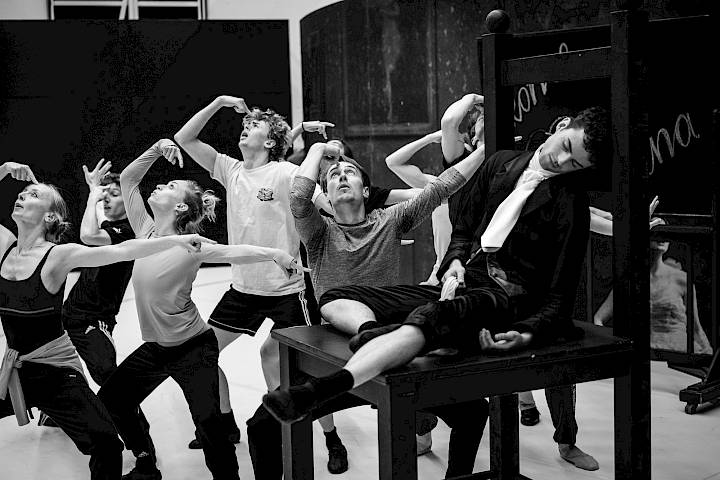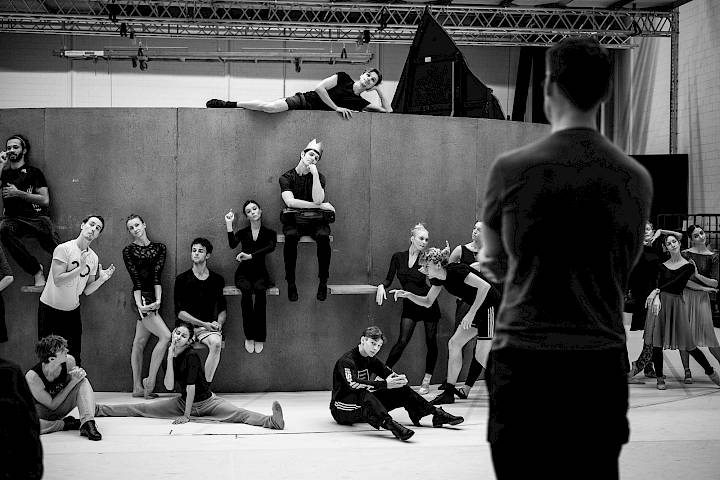Leonce und Lena
Ballet by Christian Spuck
After the comedy by Georg Büchner
Music by Johann Strauss, Josef Strauss, Amilcare Ponchielli, Léo Delibes,
Bernd Alois Zimmermann, Alfred Schnittke, Martin Donner a.o.
Duration 1 H. 50 Min. incl. intermission after 1st part after approx. 45 Min. Introduction 45 min before the performance.
Partner Ballett Zürich 
Past performances
February 2015
March 2015
April 2015
Good to know
Leonce und Lena
Abstract
Leonce und Lena
Prince Leonce of the Kingdom of Popo and his friend Valerio are passionate about doing absolutely nothing. However, now of all times, King Peter intends to resign from his official duties. Prince Leonce should now accede to the throne and get married. In order to escape an arranged marriage with a princess he does not know, Leonce flees to Italy. The bride chosen for him, Princess Lena of the Kingdom of Pipi, also has no intention whatsoever of marrying a man she does not know, and escapes the royal marriage plans with her governess. The two meet en route – and fall in love. Ignorant of one another’s identity, they appear masked at the court of Leonce’s court and are married to each other. One cannot escape one’s predetermined fate…
Christian Spuck proves that a comedy about boredom can be anything but boring in his balletic interpretation, in which he transforms Georg Büchner’s sarcastic stage play into a subtle, fast-paced, robotic farce. Polkas and waltzes by the Strauss dynasty as well as contemporary music by Alfred Schnittke and Bernd Alois Zimmermann provide the soundtrack for the tragicomic story, and emphasise its satirical elements.
Leonce und Lena
Synopsis
Leonce und Lena
PART 1
Leonce, the prince of the kingdom of Popo, lies in the garden and passes his boredom while the court master tries unsuccessfully to acquaint him with the duties of government. Valerio, a fun-loving idler, befriends Leonce. King Peter of the kingdom of Popo has his two dressers put on the robes of state. However, a knot in his handkerchief disturbs the king's ceremony because both he and the ministers cannot think of what the mnemonic is supposed to remind him of.
At a dance party in the ballroom of the kingdom of Popo, Leonce has his mistress Rosetta called to him, but sends her away again, bored. During the party, the president of the state declares that the wedding with Princess Lena from the kingdom of Pipi, which was arranged long ago, is to take place the next day.
The court urges Leonce to finally fulfill his duties as heir to the throne. Thereupon Leonce and Valerio decide to flee. In the courtly garden of the kingdom of Pipi, Princess Lena sits and thinks about the meaning of life in an unwanted marriage to a prince she does not know. The parental arrangement is unbearable for her. She longs for freedom and in youthful defiance plans to escape with her governess. Near an inn, the paths of the two women cross with those of Leonce and Valerio.
PART 2
The inn guests are in the garden, where Valerio and the governess also take a liking to each other. Away from the hustle and bustle, Leonce and Lena fall in love. A togetherness full of longing for love, but also full of skepticism, develops between the two, who have been disappointed by life up to now.
The unprecedented feeling of happiness leads Leonce to a death wish, from which Valerio is able to dissuade him at the last minute. In the kingdom of Popo, the court is making all the preparations for the wedding of the prince and princess. However, the bride and groom are missing. Leonce, Lena, the governess and Valerio join the guests masked as automatons. Led by Valerio, Leonce and Lena come to the fore. King Peter has the "strangers" married. With the subsequent unmasking of the bride and groom, both the royal family and Leonce and Lena realize the double fate: the intended couple have fallen in love with each other in freedom and the court has married the couple that was actually declared missing. The affairs of state are placed in Leonce's hands, Valerio takes the post of Minister of State and wants to decree general idleness. Thus, everything remains the same and everyone takes the position that was intended for them.
MUSIC - FIRST PART
PROLOGUE
Overture: Johann Strauss (father): Chinese Gallop
Martin Donner: Prologue
LEONCE AND VALERIO FROM POPO
Bernd Alois Zimmermann: Prologue from The Yellow and the Green
Johann Strauss (son): Perpetuum Mobile
Eartha Kitt: Let's Do It
KING PETER AND HIS MINISTERS
Alfred Schnittke: Ball from the "Gogol Suite
Martin Donner: Gadget Society
ROSETTA / THE DECISION TO FLEE
Amilcare Ponchielli: Dance of the hours from "La Gioconda
Bernd Alois Zimmermann: Little Waltz from "The Yellow and the Green
LENA AND HER GOVERNESS FROM PIPI
Bernd Alois Zimmermann: Petite valse lunaire from "Un petit rien
Léo Delibes: Pizzicato from "Sylvia
ESCAPE
Alfred Schnittke: The coat from "Gogol Suite
Hank Cochran: Little Bitty Tear
Bernd Alois Zimmermann: Phantasmagoria from "The Yellow and the Green
Alfred Schnittke: Overture from the "Gogol Suite
Intermission: Martin Donner: Statics
MUSIC - SECOND PART
Overture: Johann Strauss (son): Klipp-Klapp -Galopp
from the operetta "Waldmeister
TAVERN
Johann Strauss (son): Overture from "Die Fledermaus
Bernd Alois Zimmermann: Phantasmagoria from "The Yellow and the Green
Johann Strauss (son) and Josef Strauss: Pizzicato Polka
LEONCE AND LENA
The Mamas and the Papas: Dream a Little Dream
Martin Donner: Love Pattern
WEDDING PREPARATIONS
Bernd Alois Zimmermann: The ride through the forest from the "fairy tale suite
Bernd Alois Zimmermann: Burlesque from "The Yellow and the Green
Johann Strauss (son): Artists' Quadrille
AUTOMATONS
Martin Donner: Eternal Marriage
Alfred Schnittke: The Game from "The Commissioner
Bernd Alois Zimmermann: Epilogue from "The Yellow and the Green
Josef Strauss: Chatterbox
EPILOG
Hank Cochran: Little Bitty Tear
Biographies
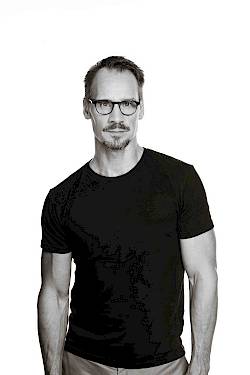
Christian Spuck,
Christian Spuck
Christian Spuck stammt aus Marburg und wurde an der John Cranko Schule in Stuttgart ausgebildet. Seine tänzerische Laufbahn begann er in Jan Lauwers’ Needcompany und Anne Teresa de Keersmaekers Ensemble «Rosas». 1995 wurde er Mitglied des Stuttgarter Balletts und war von 2001 bis 2012 Hauschoreograf der Compagnie. In Stuttgart kreierte er fünfzehn Uraufführungen, darunter die Handlungsballette Lulu. Eine Monstretragödie nach Frank Wedekind, Der Sandmann und Das Fräulein von S. nach E.T.A. Hoffmann. Darüber hinaus hat Christian Spuck mit zahlreichen namhaften Ballettcompagnien in Europa und den USA gearbeitet. Für das Königliche Ballett Flandern entstand 2006 The Return of Ulysses, beim Norwegischen Nationalballett Oslo wurde Woyzeck nach Georg Büchner uraufgeführt. Das Ballett Die Kinder beim Aalto Ballett Essen wurde für den «Prix Benois de la Danse» nominiert, das ebenfalls in Essen uraufgeführte Ballett Leonce und Lena nach Georg Büchner wurde von den Grands Ballets Canadiens de Montréal, dem Charlotte Ballet, USA, dem Tschechischen Nationalballett Prag und vom Stuttgarter Ballett übernommen. Die Uraufführung von Poppea//Poppea für Gauthier Dance am Theaterhaus Stuttgart wurde 2010 von der Zeitschrift «Dance Europe» zu den zehn erfolgreichsten Tanzproduktionen weltweit gewählt sowie mit dem deutschen Theaterpreis Der Faust 2011 und dem italienischen «Danza/Danza-Award» ausgezeichnet. Christian Spuck hat auch Opern inszeniert: Auf Glucks Orphée et Euridice an der Staatsoper Stuttgart folgten Verdis Falstaff am Staatstheater Wiesbaden sowie Berlioz’ La Damnation de Faust und Wagners Fliegender Holländer an der Deutschen Oper Berlin. Von 2012 bis 2023 war Christian Spuck Direktor des Balletts Zürich. Hier waren seine Choreografien Romeo und Julia, Leonce und Lena, Woyzeck, Der Sandmann, Messa da Requiem, Nussknacker und Mausekönig, Dornröschen und Monteverdi zu sehen. Das 2014 in Zürich uraufgeführte Ballett Anna Karenina nach Lew Tolstoi wurde in Oslo, am Moskauer Stanislawski-Theater, vom Koreanischen Nationalballett und vom Bayerischen Staatsballett ins Repertoire übernommen. 2018 hatte in Zürich Spucks Ballett Winterreise Premiere, für das er mit dem «Prix Benois de la Danse 2019» ausgezeichnet wurde. 2019 folgte beim Ballett Zürich Helmut Lachenmanns Das Mädchen mit den Schwefelhölzern (Auszeichnung als «Produktion des Jahres und Kompanie des Jahres für das Ballett Zürich durch die Zeitschrift tanz). Für das Moskauer Bolschoitheater kreierte er 2021 sein Ballett Orlando nach Virginia Woolf. Spucks Messa da Requiem wurde nicht nur zum Adelaide Festival nach Australien eingeladen, sondern auch vom Het Nationale Oper & Ballet Amsterdam und vom Finnischen Nationalballett übernommen. Seit Beginn der Saison 2023/24 ist Christian Spuck Intendant des Staatsballetts Berlin.
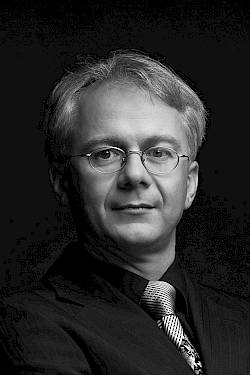
Pavel Baleff,
Pavel Baleff
Pavel Baleff ist Chefdirigent der Philharmonie Baden-Baden. Engagements als Opern- und Konzertdirigent führten ihn u.a. an das Zürcher Opernhaus, die Dresdner Semperoper, das Leipziger Gewandhaus, die Hamburgische Staatsoper, das Bolschoi Theater Moskau, die Oper Montpellier, zum Dänischen Nationalorchester, zum Mozarteum Orchester Salzburg sowie zu den Rundfunksinfonieorchestern des WDR und des BR. Er leitete Aufführungen, Fernsehaufzeichnungen und CD-Produktionen mit international renommierten Solisten wie Krassimira Stoyanova, Diana Damrau, Edita Gruberova und Vesselina Kasarova, Ramón Vargas, Anne-Sophie Mutter, Anna Netrebko, Thomas Hampson, Piotr Beczala und Luca Pisaroni. Seine CD-Produktionen mit der Sopranistin Krassimira Stoyanova und dem Münchner Rundfunkorchester wurden 2012 und 2014 mit dem Jahrespreis der Deutschen Schallplattenkritik und dem International Classic Music Award prämiert. Anlässlich der von ihm geleiteten Ersteinstudierung des Ring des Nibelungen in Bulgarien an der Nationaloper in Sofia wurde er zum bulgarischen «Dirigenten des Jahres» gewählt. 2016 debütierte er an der Wiener Staatsoper mit L’elisir d’amore und 2017 an der Staatsoper Stuttgart mit Romeo und Julia. Am Opernhaus Zürich dirigierte er in jüngster Zeit Schwanensee sowie die beiden Opern von Ravel L’Heure Espagnole und L’Enfant et les sortilèges. Pavel Baleff ist 1. Preisträger beim Carl-Maria-von-Weber-Wettbewerb in München sowie beim Internationalen Bad Homburger Dirigentenwettbewerb, wurde in das Dirigentenforum des Deutschen Musikrates aufgenommen und erhielt eine Auszeichnung durch die Herbert von Karajan Stiftung.
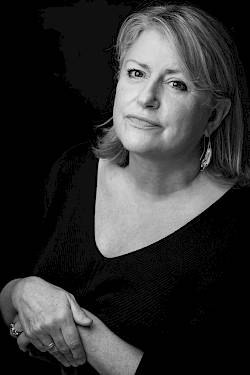
Emma Ryott,
Emma Ryott
Emma Ryott trained at Trent Polytechnic with a BA in Theatre Design. Ever since their first collaboration in 2003, Emma Ryott and Christian Spuck continued working together for ballet and opera productions, such as Lulu. Eine Monstretragödie in Stuttgart, Anna Karenina in Zurich, Oslo and Moscow, Romeo und Julia in Zurich, Woyzeck in Oslo and Zurich, Das Fräulein von S. in Stuttgart, Leonce und Lena in Montréal, Stuttgart und Zurich, Der Sandmann in Stuttgart und Zurich, Poppea / Poppea und Don Q. for Gauthier Dance, The Return of Ulysses for das Royal Ballet of Flanders, La Damnation de Faust at the Deutsche Oper Berlin, Falstaff in Wiesbaden and Orfeo ed Euridice in Stuttgart. She also works closely with director Keith Warner. Their collaborations include Mathis der Maler at Theater an der Wien, Manon Lescaut at the English National Opera as well as La Damnation de Faust and Harbison’s The Great Gatsby at the Semperoper Dresden. Other designs were created for Sunset Boulevard and Manon Lescaut (Goteborg), Otello (Salzburg), The Heart of Robin Hood for the Royal Shakespeare Company (awarded with Elliot Norton Award for outstanding design), Rock ‘n Roll by Tom Stoppard (London Royal Court, West End and Broadway), Chekhov-trilogy directed by Jonathan Kent (National Theatre, London) and the New Year’s Day Concert, Vienna, 2016.
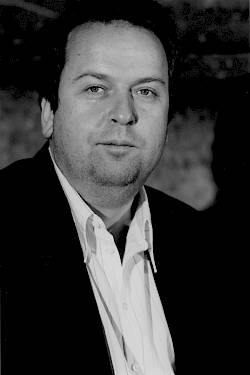
Reinhard Traub,
Reinhard Traub
Reinhard Traub absolvierte eine Ausbildung als Grafikdesigner und Berufspilot. Von 1980 bis 1985 war er Assistent bei Chenault Spence und gestaltete anschliessend u. a. zwei Welttourneen mit den Produktionen Sophisticated Ladies und Carmen Jones als Lichtdesigner. Seit 1992/93 war er bei den Bühnen Graz tätig und konzipierte Lichtdesigns für Produktionen an den Opernhäusern von Amsterdam, Zürich, Brüssel, Hamburg, Helsinki, Hongkong, Kopenhagen, London, Los Angeles, Madrid, Montreal, Moskau, München, Oslo, für die Salzburger Festspiele, das Glyndebourne Festival sowie für das Hamburger Thalia Theater, die Volksbühne Berlin und das Burgtheater in Wien. Reinhard Traub arbeitet regelmässig mit Regisseuren wie Johann Kresnik, Martin Kušej und Christof Loy zusammen. Seit 2006/07 ist Reinhard Traub Leiter der Beleuchtungsabteilung der Staatsoper Stuttgart. Dort ist er Lichtdesigner für Produktionen wie Jenůfa, Der Schaum der Tage, Ariadne auf Naxos, Nabucco sowie Die Nachtwandlerin, Platée, Der fliegende Holländer, Parsifal und La Bohème. 2017 war Reinhard Traub für das Lichtdesign der Produktion Aida bei den Salzburger Festspielen verantwortlich, ausserdem für Tristan und Isolde (2015), Parsifal (2016) und Lohengrin (2018) bei den Bayreuther Festspielen, denen er zukünftig bei Tannhäuser und Der Ring des Nibelungen verbunden sein wird. Darüber hinaus unterrichtet Reinhard Traub seit 2001 an der Staatlichen Akademie der Bildenden Künste in Stuttgart.
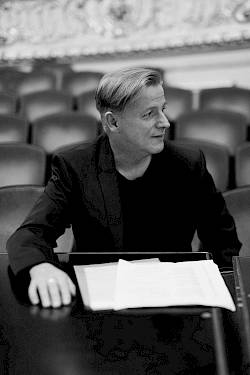
Michael Küster,
Michael Küster
Michael Küster stammt aus Wernigerode (Harz). Nach dem Studium der Germanistik, Kunst- und Sprechwissenschaft an der Universität Halle war er Moderator, Autor und Sprecher bei verschiedenen Rundfunkanstalten in Deutschland. Dort präsentierte er eine Vielzahl von Klassik-Programmen und Live-Übertragungen wichtiger Konzertereignisse, u. a. aus der Metropolitan Opera New York, der Semperoper Dresden und dem Leipziger Gewandhaus. Seit 2002 ist er Dramaturg am Opernhaus Zürich, u. a. für Regisseure wie Matthias Hartmann, David Alden, Robert Carsen, Moshe Leiser/ Patrice Caurier, Damiano Michieletto, David Pountney, Johannes Schaaf und Graham Vick. Als Dramaturg des Balletts Zürich arbeitete Michael Küster seit 2012 u. a. mit Cathy Marston, Marco Goecke, Marcos Morau, Edward Clug, Alexei Ratmansky, William Forsythe, Jiří Kylián und Hans van Manen, vor allem aber mit Christian Spuck zusammen (u. a. Romeo und Julia, Messa da Requiem, Winterreise, Dornröschen). An der Mailänder Scala war er Dramaturg für Matthias Hartmanns Operninszenierungen von Der Freischütz, Idomeneo und Pique Dame.
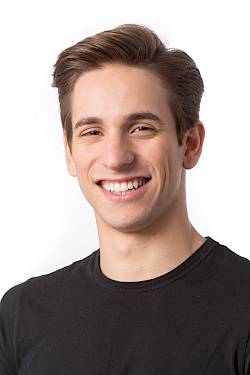
Denis Vieira,
Denis Vieira
Denis Vieira is from Brazil. A graduate of his home country’s Bolshoi Theatre School, he danced various roles for the Teatro Municipal in Rio de Janeiro including Onegin/Lensky in John Cranko’s Onegin, Romeo in Cranko’s Romeo and Juliet, Adam in Uwe Scholz’s Adam and Eve, Albrecht in Peter Wright’s Giselle and Prince Siegfried in Yelena Pankova’s Swan Lake. He joined Ballett Zürich in 2014, since when he has been seen in Schläpfer’s Forellenquintett, Kylián’s Wings of Wax, Kairos by Wayne McGregor and Sonett by Christian Spuck. He has also danced Tybalt and Romeo in Spuck’s Romeo and Juliet, Vronsky in his Anna Karenina, Leonce in his Leonce und Lena and Albrecht in Patrice Bart’s Giselle. He was also the recipient of the Friends of Ballett Zürich’s Dance Prize for 2015.
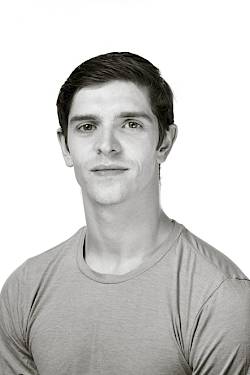
Matthew Knight,
Matthew Knight
Matthew Knight is British. He completed his training at the Elmhurst School and the Royal Ballet School in London. After a season with the Junior Ballett, he joined Ballett Zürich in the 2014/15 season. He presented Jane Doe and Mocambo as part of the «Junge Choreografen» series. He has danced in choreographies by Mats Ek (Cavalier in Dornröschen), William Forsythe, Marco Goecke (Moor in Petruschka), Jiří Kylián, Douglas Lee, Sol León/Paul Lightfoot, Hans van Manen, Wayne McGregor, Ohad Naharin, Crystal Pite, and Filipe Portugal. He was Leonce in Christian Spuck’s Leonce und Lena, Nathanael in Spuck’s Der Sandmann and the Clown in Spuck’s Nussknacker und Mausekönig. In 2018 he also appeared as the title roles in Edward Clug’s Faust and in Marco Goecke’s Nijinski. In 2016 he was awarded the «Tanzpreis der Freunde des Balletts Zürich».
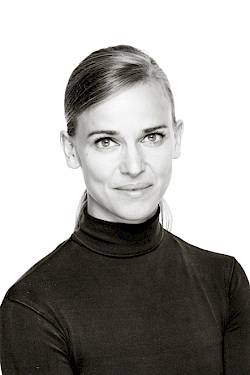
Katja Wünsche,
Katja Wünsche
Katja Wünsche comes from Dresden and was trained at the Staatliche Ballettschule Berlin. She has won prizes at numerous ballet competitions. From 1999 to 2012 she danced in the Stuttgart Ballet, including as a principal dance from 2006. She danced leading roles in choreographies by John Cranko (Romeo und Julia, Der Widerspenstigen Zähmung, Onegin), John Neumeier (Endstation Sehnsucht, Die Kameliendame), Marcia Haydée (Dornröschen, La Sylphide, La fille mal gardée) and Christian Spuck (Lulu, Der Sandmann, Leonce und Lena, Das Fräulein von S.) and ballets by Forsythe, Kylián, León/Lightfoot and Goecke. In 2007 she was awarded the German Dance Prize Future (for promising young artists) and the German Theater Prize Der Faust. Katja Wünsche has been a first soloist with Ballett Zürich since the 2012/13 season. She has been seen in Zurich as Julia in Spuck’s Romeo und Julia, Lena in Leonce und Lena, Marie in Woyzeck, Anna Karenina and Kitty in Anna Karenina and Clara in Der Sandmann. She has also performed in choreographies by Sol León/Paul Lightfoot, Douglas Lee, Martin Schläpfer, Wayne McGregor and Marco Goecke. In 2014 she was awarded the «Tanzpreis der Freunde des Balletts Zürich».
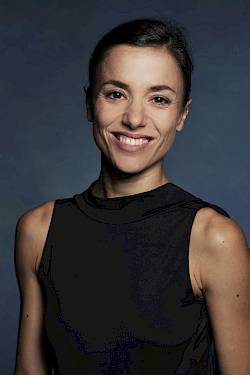
Giulia Tonelli,
Giulia Tonelli
Giulia Tonelli comes from Italy. She graduated from the Balletto di Toscana and the Ballet School of the Vienna State Opera. After her first engagement at the Vienna State Opera, she danced from 2002 to 2010 with the Royal Ballet of Flanders in Antwerp and from 2004 as a demi-soloist. There she danced Giselle (Petipa) as well as solo roles in choreographies of Forsythe, Balanchine, Kylián, Haydée and Spuck. She has been a member of Ballett Zürich since the 2010/11 season, where she has performed ballets by Spoerli, Goecke, McGregor, Lee, Forsythe, Kylián and Balanchine. She danced Julia in Christian Spuck’s Romeo und Julia, Lena in Spuck’s Leonce und Lena and Betsy in Anna Karenina. In Alexei Ratmansky’s Schwanensee reconstruction she danced in the Pas de trois and she also performed in Forsythe’s Quintett and Spuck’s Messa da Requiem. Last season’s highlights include Emergence by Crystal Pite and Gretchen in Edward Clug’s Faust. During the «Junge Choreografen» series she presented the works Mind Games and Klastos together with Mélissa Ligurgo. In 2013 she was awarded the Giuliana Penzi Prize. In 2017 she received the «Tanzpreis der Freunde des Balletts Zürich».
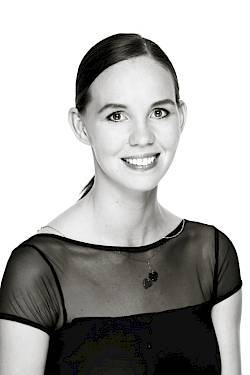
Viktorina Kapitonova,
Viktorina Kapitonova
Viktorina Kapitonova, who is a native of Russia, studied at the Kazan Ballet School and Moscow’s Bolshoi Theatre Academy. The winner of both the Young Ballet of Russia competition and the Arabesque contest of 2008, from 2005 onwards she danced at the Jalil Opera House in Kazan, performing solo roles in Swan Lake, The Sleeping Beauty, Don Quixote, La Bayadère, Coppélia and The Nutcracker. She was a member of the Stanislavsky Ballet for the 2008/09 season; and she joined Ballett Zürich in 2010, since when her performances have included Odette/Odile in Heinz Spoerli’s Swan Lake, solos in Spoerli’s A Midsummer Night’s Dream, Wäre heute morgen und gestern jetzt, ...und mied den Wind and Goldberg Variations, Rosetta in Christian Spuck’s Leonce and Lena, the nurse in Spuck’s Romeo and Juliet and the leading role in Spuck’s Anna Karenina. She has also been seen in choreographies by Balanchine, Ek, Forsythe, Kylián, Lee, McGregor and Schläpfer. She presented her choreography Two Bodies – One Soul as part of the company’s Young Choreographers programme. As Giselle/Myrtha she was seen in Patrice Bart’s Giselle, alongside Roberto Bolle and Friedemann Vogel. She was also the recipient of the Friends of Ballett Zürich’s Dance Prize for 2015. Last season her roles included Odette/Odile in the reconstruction of Swan Lake by Alexei Ratmansky as well as Olimpia in Christian Spuck’s Der Sandmann.
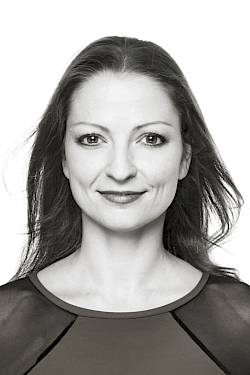
Galina Mihaylova,
Galina Mihaylova
The Bulgarian dancer Galina Mihaylova completed her education at the Bulgarian State Choreographic School and the Swiss Professional Ballet School, where she was a Nureyev Foundation scholarship holder. In the 1999/2000 season she became a member of the Ballett Zürich. She danced here in numerous choreographies by Heinz Spoerli. She has appeared as Effie (La Sylphide), Amor (Don Quixote), Helena (A Midsummer Night’s Dream), in Wäre heute morgen und gestern jetzt, as Odette/Odile (Swan Lake) and Henriette (Raymonda). She has also performed in ballets by William Forsythe, Jiří Kylián, Twyla Tharp, Uwe Scholz, and Jiří Bubeniček. She danced the Nurse in Romeo and Juliet, Margret in Woyzeck and Dolly in Anna Karenina (all by Christian Spuck). She has also appeared in choreographies by Wayne McGregor, Marco Goecke, and George Balanchine.
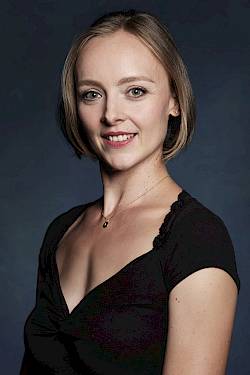
Mélanie Borel,
Mélanie Borel
Mélanie Borel comes from France. She studied at the École Nationale Supérieure de Danse in Marseille and at the École de Danse de l’Opéra de Paris. Engagements have taken her to the Ballet de l’Opéra National de Bordeaux and, from 2005 to 2008, to the Peter Schaufuss Ballet in Denmark. She has been a member of Ballett Zürich since the 2008/09 season and has performed as a soloist in choreographies by Twyla Tharp, Heinz Spoerli, and Mats Ek. She was the Haushofmeister in Spuck’s Leonce und Lena and danced the «Cholerisch» variation in Balanchine’s The Four Temperaments. In addition, she has appeared in choreographies by Marco Goecke, Douglas Lee, Jiří Kylián, Wayne McGregor, Martin Schläpfer, Hans van Manen, Edward Clug and Crystal Pite.
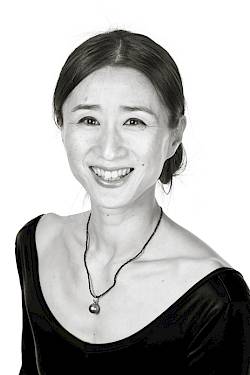
Yen Han a.G.,
Yen Han a.G.
Chinese-American dancer Yen Han studied with Stefan Mucsi and Paul Maure in Los Angeles, at the Hartford Ballet School, at the San Francisco Ballet, and at the Beijing Dance Academy. After engagements with the Jeune Ballet de France and the Ballet de Nice, she was engaged as a principal dancer in the Ballett Zürich in 1994, where she has proven to be one of the most versatile and charismatic dancers in a variety of leading roles. Heinz Spoerli choreographed Le Sacre du printemps, Peer Gynt, Daphnis et Chloé, Romeo and Juliet, and A Midsummer Night’s Dream for her. She worked with Mats Ek on Sleeping Beauty (Aurora), and at the Royal Swedish Opera on Romeo and Juliet (Juliet). Other important choreographers she has worked with include Nicholas Beriozoff, Hans van Manen, Jiří Kylián, William Forsythe, Mauro Bigonzetti, Twyla Tharp, Christopher Wheeldon, Patrice Bart, Lin Hwai Min, Sol León/Paul Lightfoot, Martin Schläpfer, and Filipe Portugal. She has been seen in works by Christian Spuck, as Juliet (Romeo and Juliet), Court Master (Leonce and Lena), Kitty (Anna Karenina), in Messa da Requiem and as the Clown (Nutcracker and Mouse King). In 2013 she was honored with the Dance Prize of the Friends of Ballett Zürich and the Outstanding Female Dancer prize at the Swiss Dance Awards.
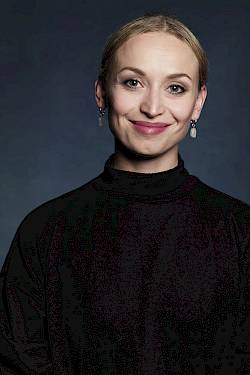
Irmina Kopaczynska,
Irmina Kopaczynska
Irmina Kopaczynska was born in Poland. She studied at the Polish National Ballet School Poznan. She won several prizes in the Polish National Ballet Competition. She also took part in the «Premio Roma» and the «Prix de Lausanne». After two seasons with the Junior Ballett, she became a member of Ballett Zürich starting with the 2011/12 season. She danced the Silver Fairy in Mats Ek’s Dornröschen, Betsy in Christian Spuck’s Anna Karenina, and the Nursemaid in Spuck’s Romeo und Julia. She has also appeared in choreographies by William Forsythe (In the middle, New Sleep), Hans van Manen (Kammerballett), Jiří Kylián (Gods and Dogs, Bella Figura), Iacopo Godani, Edward Clug, Marco Goecke (including the Mother in Nijinski), Douglas Lee, and Crystal Pite.


